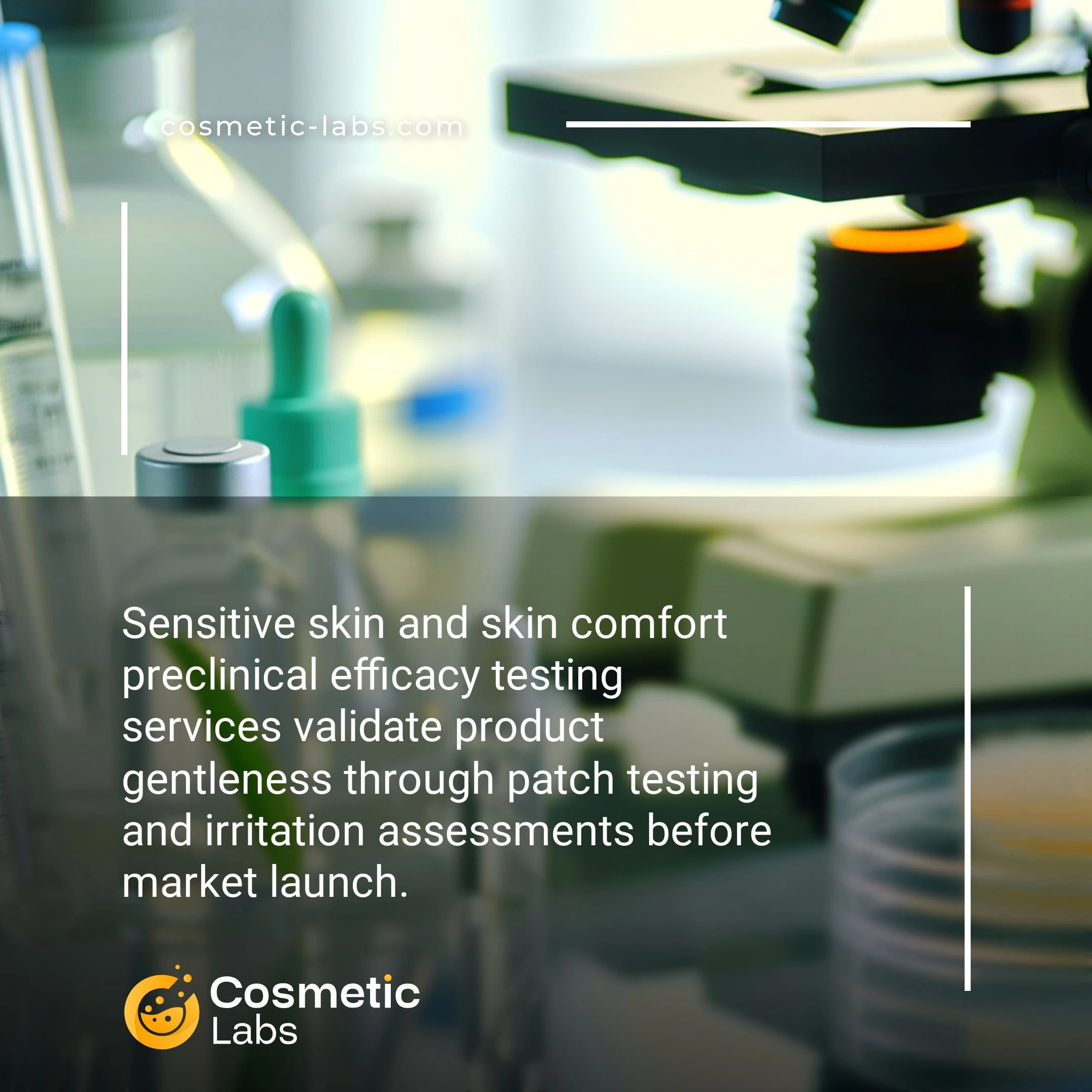Sensitive Skin Testing Services for Cosmetic Brands

What is Sensitive skin and skin comfort efficacy testing?
Sensitive skin and skin comfort preclinical efficacy testing services evaluate how gentle cosmetic formulations are before human trials through in vitro irritation assays and biomarker analysis. Labs use reconstructed skin models and inflammatory response measurements to predict product tolerance, helping you avoid costly reformulations and ensure your gentle skincare claims hold up under regulatory scrutiny.
Why do you need this service?
Cosmetic brands leverage sensitive skin tolerance testing to validate gentle formulations before market launch, using patch testing and irritation protocols to demonstrate product safety. Labs conduct comfort assessment studies that measure skin barrier function and inflammatory markers, delivering clinical data packages that support marketing claims and regulatory submissions for hypoallergenic and dermatologist-tested product positioning.
Who provides Sensitive skin and skin comfort efficacy testing services?
All cosmetic labs providing Sensitive skin and skin comfort efficacy testing services
There is no company providing these services at the moment.
Sensitive Skin and Skin Comfort Preclinical Efficacy Testing Services
Cosmetic labs provide sensitive skin testing services that validate product gentleness and comfort claims before market launch. These preclinical assessments help brands develop formulations that minimize irritation while delivering measurable benefits to reactive skin types.
Irritation and Sensitivity Assessment Protocols
Labs use standardized patch testing methods to evaluate product compatibility with sensitive skin. The most common protocols include 24-hour and 48-hour occlusive patch tests on human volunteers with known skin sensitivities.
Testing typically involves:
- Single application patch tests for immediate reactions
- Repeated insult patch tests (RIPT) for cumulative irritation
- Stinging and burning sensation evaluations
- Photosensitivity assessments under UV exposure
Results provide concrete data on irritation potential, helping brands refine formulations and support marketing claims about gentleness.
Skin Comfort and Tolerance Validation
Beyond basic safety, labs measure how products affect skin comfort through instrumental analysis and subjective evaluations. These studies track changes in skin barrier function, hydration levels, and user-reported comfort over time.
Key measurements include:
- Transepidermal water loss (TEWL) monitoring
- Skin pH and microbiome impact assessment
- Erythema and inflammation scoring
- Consumer perception studies on comfort and tolerability
These comprehensive evaluations help brands document their products’ suitability for sensitive skin consumers. Connect with specialized labs on our platform to discuss your specific testing requirements and timeline needs.
3 subcategories of Sensitive skin and skin comfort efficacy testing services
There are no results matching your search
Practical Applications of Sensitive Skin and Skin Comfort Preclinical Efficacy Testing
Cosmetic labs deliver targeted testing protocols that validate product safety and performance claims before market launch, helping brands build consumer trust through scientific evidence.
Product Development and Formulation Optimization
Labs conduct sensitive skin preclinical efficacy testing during early formulation stages to identify potential irritants and optimize ingredient concentrations. Patch testing protocols using reconstructed human epidermis models reveal skin compatibility within 48-72 hours. Teams adjust formulations based on cytotoxicity assays, barrier function measurements, and inflammatory marker analysis.
This approach reduces reformulation costs by 40-60% compared to post-development testing. Labs also perform comparative studies against competitor products, providing benchmarking data that guides positioning strategies.
Regulatory Compliance and Marketing Claims Support
Preclinical testing generates documentation required for regulatory submissions across different markets. Labs use standardized protocols like OECD guidelines for skin irritation and sensitization testing. Results support marketing claims such as “dermatologist-tested” or “suitable for sensitive skin.”
Testing portfolios include skin barrier function assessment, anti-inflammatory activity measurement, and hypoallergenic validation studies. Labs provide detailed reports with statistical analysis that meet FDA, EU, and international regulatory requirements for cosmetic safety dossiers.
| Testing Method | Timeline | Primary Application | Regulatory Value |
|---|---|---|---|
| 3D Skin Model Irritation | 3-5 days | Early formulation screening | OECD 439 compliance |
| Cytokine Release Assay | 24-48 hours | Anti-inflammatory claims | Marketing support |
| Barrier Function Testing | 7-14 days | Moisturizer efficacy | EU cosmetic regulation |
| Sensitization Prediction | 2-3 weeks | Allergen identification | Global safety assessment |
Ready to validate your sensitive skin formulations? Contact specialized cosmetic labs on our platform to discuss your specific testing requirements and regulatory goals.

